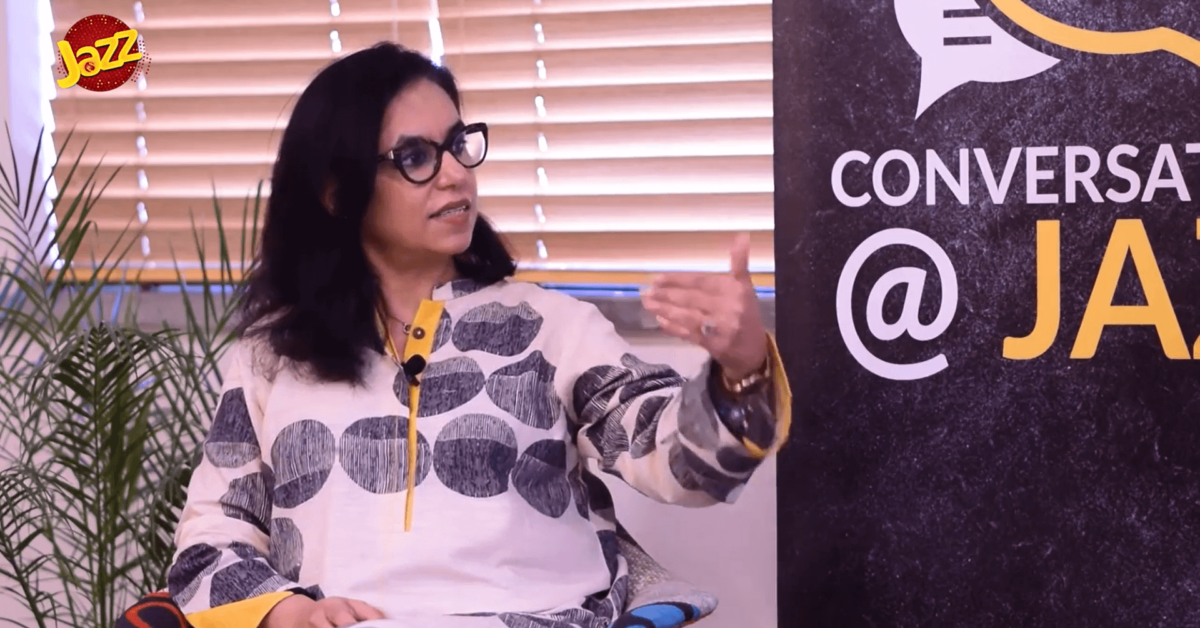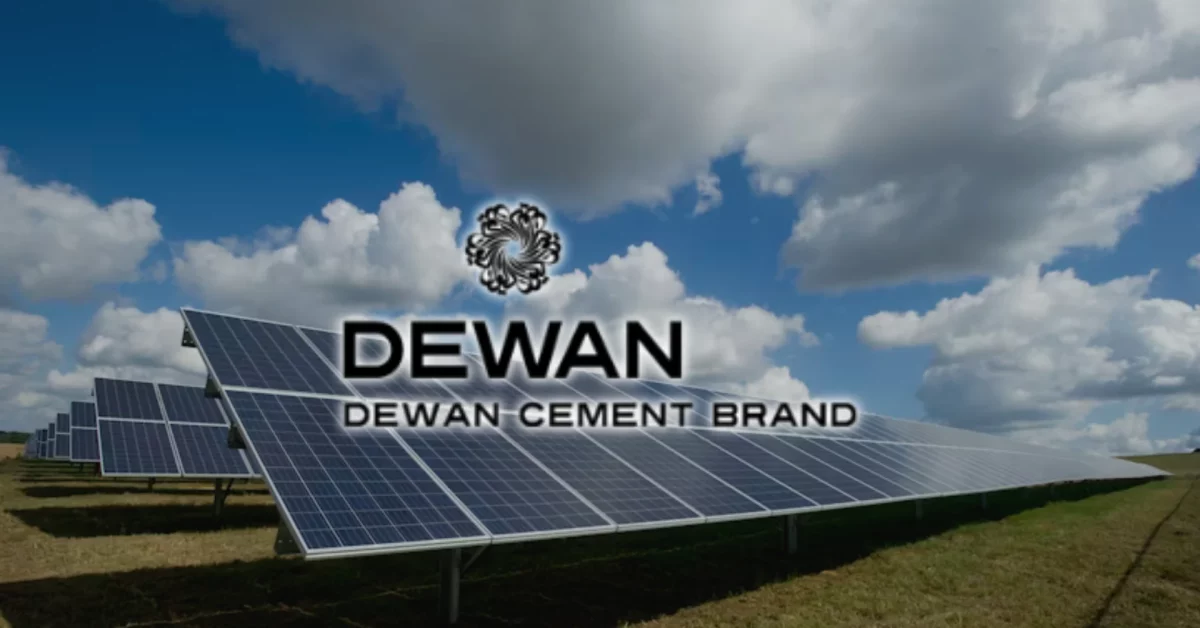
Top 10 Apps to Download in Pakistan
December 2, 2019
Sustainable Development Goals and the Need for Innovation
December 5, 2019What’s Inhibiting Digital Adoption? | Conversations@Jazz
This Conversations@Jazz is with the Founder and Managing Director of Kashf Foundation. Roshaneh Zafar is a veteran in the field of microfinance for women in Pakistan. She speaks to us about the contribution of women in terms of economic impact, their high-return rate of microloans, and the empowerment of communities that led to better health and education. We discuss how critical trust is to the decision of women adopting digital financial services and we also speak of how revolutionary it is for any emerging economy to integrate women into the formal sector. This is by far one of the most significant conversations to gain insight into the barriers to mobile banking.
Kashf Foundation is the first specialized microfinance company to be set up in Pakistan which provides financial services to low-income families. In a pilot project with JazzCash, Roshaneh recalls that the inhibitions women had to digital adoption revolved around education levels and concerns about the confidentiality of their personal data. She is a big proponent of always designing products and services with the convenience of the end-user in mind – women have several socio-cultural factors that are not played into the product design. The first step to using or leveraging digital finance is improving women’s education. Women are at the lowest end of telephony – the majority of them do not even own cell phones – now an increasing part of development criteria. When it comes to financial inclusion and financial diversification in South Asia, the numbers are actually declining. Roshaneh explains that the systemic gender bias of tech developers have a big contribution to this regression.
Talking about her role models, Roshaneh mentions her grandmother, Malika Pukhraj, a strong believer of women empowerment who encouraged education for girls in her family. The notion that only women can empower women, according to Roshaneh, is completely incorrect. “One of the most liberal people that I know is my father and he has never differentiated between men and women. In fact, I think because of him we are what we are today, whether it is my brothers, me, or anyone else in my family”, she adds.
Aisha: Hi, this is Aisha Sarwari. I’m the Director for Corporate Comms and Sustainability at Jazz. Thank you, for being here and for being part of our Conversations at Jazz. Today, we have Roshaneh Zafar. Very honored to have you here today. She’s one of the pioneering people in Pakistan who started off the empowerment of women through microfinance. Roshaneh, thank you so much for being here with us today.
Roshaneh: No problem, it’s a pleasure to be here, Aisha.
Aisha: Roshaneh, I think we’ll start off by just asking you to give us a bit of a landscape about the empowerment of women in Pakistan. You speak of microfinance; you’ve started it well before a lot of people in Pakistan even knew that a lot of women at grassroots level can get empowered through microloans. And you’re one of the first people who told us that there’s a very high chance of return of those loans, you know, a lot of people in the banks, they never trusted the women at grassroots because they felt they were not capable or too poor to, you know, return the funds. So, what’s the landscape now?
Roshaneh: Well, if you go back 25 years ago, what you’re talking about was hell true because there were lots of myths around women and entrepreneurship and access to finance. But that was a generic thing, it wasn’t just a gender issue, it was that access to finance for low income families per se. But that changed very quickly when we came into the business. We were the first specialized micro-finance company to be setup in Pakistan which only provided financial services to low income families. So, that, with time, changed and we proved the paradigm that investing in women is smart economics. And if you really talk about empowerment which is the point that you were raising, what difference does this make? So, it’s not just about giving money to women and taking them back, that’s the easy part. It’s about helping them make decisions within the context of their families, within the context of their community and in that sense also cascading that to society as a whole. So, for example, there are, if you look at it today, when we first started out the women themselves used to say I can’t work, we are scared, we are risk averse, our families won’t agree. Now there are communities where it’s the norm and in fact, children have grown up, boys and girls have grown up in families watching their mothers taking money and earning money on that basis. So, there is an intergenerational shift happening as well. We have many clients who have put their children through school and then many of them are now working for Kashf as well, both boys and girls who have graduated or done their B.A. or F.A. so even that change is happening. So, what we see is when a woman gets the money in her hand today, she is three times more likely to send her children to school. She’s four times more likely or equipped financially to provide a more balanced, nutritional, diet for her children. She is twice as likely to save. So, you know, all these dimensions then impact on her as an influential member of the family.
Aisha: And yet you see that in terms of policy making and focus of the regulators, the governments, women somehow are not right up front, you see it in terms of only 1% women are entrepreneurs in Pakistan, you see it in terms of digital financial literacy, you see it in terms of women who have bank accounts. The one game changer can be digital financial services where, yes, fewer women have the cell phone, however, if you empower them to get the money transfers through their cellphone, their mobility, which is a large issue for women can be cut through. So, in terms of digital financial services for women being a game changer, how positive are you, how excited are you at that?
Roshaneh: Well, the jury’s still out on that. I think we’ve seen markets like Kenya where it’s massified. We’ve seen other markets like Cambodia where it is the norm. But it’s really about financial inclusion versus transaction. So, if we look at the bandwidth, it moves from where transaction is concerned, where you’re talking about have over the counter transactions, having payments happening or having utility payments taking place, that is happening and even there the traffic is not women, it’s 30% women. Now, a lot of this, in terms of the backend, is now through mobile banking, as it’s called. But, when we look at the dormancy of those accounts is over 75% so, 75% of those accounts were not really used. We have run several pilots at Kashf to see how can we push the bandwidth of women in terms of using or leveraging on digital finance. So, the first thing is education. One of the things that happens, I’m not talking about literacy, I’m talking about education in terms of trust, I’m talking about education in terms of access, I’m talking about education in terms of women understanding how to use this system. So, for example, we did a super-agent model with a bank at the background and we became super agents for that bank to open deposit accounts. We opened 30,000 deposit accounts for women across the network. This was in thirty branches that we have, in 10% of our branches, essentially. And it was across several geographies.
Aisha: This was CDNS, I believe?
Roshaneh: No, this was with UBL. So, we became their super-agent and we opened those accounts, for 11 months it worked very well and it was a well-designed product. Women like to save up for a commitment or a goal so it was goal oriented savings which worked very well but, the trust factor started to get lost because as a super-agent we are not privy to the account information. So, we worked in the frontend, UBL was at the backend. The client would come to us and say, “Acha jee, tell us the information,” and we’d say, “Well, we’ll have to call this number and you call this number and do that.” On the other side of it, it was the telephony as well. So, women are at the very lower end of telephony, when I say telephony, they’re not on smart phones, they’re on the basic Nokia type option. And many of those phones are not owned by women directly. So, 30% of the 30,000 women had their own phones, 70% did not. So, when it’s a mobile backed account, the mobile phone that you’re given becomes the owner of that so privacy and confidentiality got severely hit. So, the women came to us after 10 months of saving regularly, “We don’t want to save with you. A) We don’t trust you. B) Our husbands know the information of how much money we have. C) It’s a question of access because to get this money, I have to go through many steps.” So, we’ve been trying to leverage with the state bank on this and convince them that somehow this whole branch banking concept needs to change, it needs to come down to the level of women. This whole notion, I mean, you limit the nature of the account, you’ve already done that, you put bars on how much money can be transacted on a daily basis. But this whole anti-money laundering and terrorist financing that’s come in, that has created barriers for this to massify in Pakistan. I mean, there are education as I mentioned to you, there’s trust factors, there’s access in confidentiality factors, then there are convenience factors behind designing a product and a system that is proactive for women. So, I think the jury’s still out, we still need to do a lot of work. If you look at the numbers, we’re not doing too well, in fact the numbers are declining in South Asia when it comes to financial inclusion and financial diversification from an agenda perspective.
Aisha: Speaking to the barriers to entry and a lot of people who are designing this work don’t even understand that violence, for example, is so pervasive. So, women can be empowered but there’s something or somebody always there to take it away from them, so they recede very quickly into the margins. If you had three magic pills to change the work that you do into a very big success model, to scale it across nations and countries, what would those magic pills be? Yes, you mentioned trust, but what simple practical steps, like reduce the minimum amount you can save, you know, all of those things; what are the three things you would perhaps come up with?
Roshaneh: I think on a policy level, we have it. It’s the implementation of the policies, the barriers that we have in terms of, you know, if we’re talking about, I just gave you one example, we are not as a super-agent, the law blocks us, there’s a whole CPC which is a Consumer Protection Code that the state bank has which disallows us from, as a third party, getting that data from the bank. So, I think we need to and in fact we had asked, even requested the state bank that they should have teared licenses. So, for example, for entities like Kashf that have a certain financial benchmark, you can allow to do a certain type of deposit taking from their clients which is limited, as I’m saying, you don’t do checking accounts, you just do cash transactions and it allows you to leverage on it. Then, there is that whole ecosystem that has to go with it, for example, they’ve done the QR coding and they’ve rationalized the numbering of the QR code to make sure that it is standardized. These are the kind of things you need to do for digital finance, but on the other side you have the whole notion of merchant banking, you know the ‘thalay wala’ is not going to use a QR code like they would.
Aisha: But they’ll understand the simple scan and pay.
Roshaneh: We’ve done it with FINCA, for example, we tried the, we did the shop mobs as we called them at that time. But again, the merchant is not going to be viable unless an ecosystem builds up and that will take time. So, if we are saying that we are going to go fully digital, India did it because there was a massive push or rather there was just a do or die situation, you have to convert.
Aisha: So, they did the demonetization, right?
Roshaneh: So, yeah, you had no other option and that cost the Indian. Even though people say it’s a success, I don’t consider it to be a success.
Aisha: Actually, a lot of people say it was anti pro poor.
Roshaneh: Yeah, because a lot of people, they did not have salaries, they were not paid, they had to really suffer from it and the economy lost billions of rupees. So, you can’t have a one size fits all approach, that is for sure. Even in digital finance, it’s not going to work like that and from a gender lens it becomes even more complicated because women, as you said, do not have the economic agency, they do not have the social agency.
Aisha: Or the cultural agency, it’s not considered to be okay for them to do any of this. A lot of women actually do it undercover of, “Oh we do this, but we also run the house very well”. So, it’s almost like they have, sometimes, the worst of both worlds.
Roshaneh: But that is, to some extent, changing, also, you know, we have many many stories where women and men will now tell us, “Oh, my husband works for me”. So, as the business is grown, it’s the man who has joined his wife, I mean, there are many many stories I can share with you where this has happened. I was just in Kasur some time ago and one of my clients who runs a very interesting business, she does these spools for thread. So, she buys raw thread, dyes it and puts it on spools, so she has these spooling machines in her backyard, essentially. So, she started this very small with one machine, she has worked somewhere in this business earlier and when she got married, she thought she would set this up, which is very innovative. And now, she was telling me the other day that it’s my husband who works for me and he was very proudly sitting there saying yes, I work for my wife. So, these things do change, economic agency does bring about vanity.
Aisha: It really does that. And unfortunately, patriarchy has been very money centered so if your money changes hands, so does patriarchy.
Roshaneh: It’s patriarchy to the extent of, I see it from an economist perspective which is the opportunity cost and I’ll again share an example. So, I mean it’s not just about patriarchy, it’s also got an economic side to it which is the opportunity cost and I’ll give you an example of this. Every two years, we undertake, we are one of the very well researched organization, that’s our forte, we always try and study for evidence and facts and trends. So, one of the things we do is an impact assessment every two years and in that there’s a section on domestic violence, because you raised that as a point. And microfinance has been blamed, at times, for leading to violence against women in the homes or because, you know, when payment doesn’t happen, then there are fights in the family and it can escalate into situation.
Aisha: I’m very interested to know what that is because I’ve heard that, the money comes into the house and the woman gets beaten black and blue.
Roshaneh: So, what we have seen is to the contrary and we interview both the women and their spouses, separately. So, what we’ve seen is that 60% of men told us that instances of domestic violence in the past six months have actually gone down. And the same corollary was 50% from the women. And when we further probed it and asked them why, 90% said they major reason for domestic fights escalating into violence is over money and since my wife is working now and she has her own money, it’s taking the pressure off. So, again, you know, we have to balance this argument, it’s not just about transactions, as I always say, it’s about transformation and it transforms relationships in particular. So, patriarchy, yes, has a linchpin in the economy, but it’s the economy that sometimes supersedes patriarchy.
Aisha: Yeah, absolutely, that’s fantastic. Roshaneh, you have won several awards, you’ve been one of the women in Pakistan who have really championed this cause. What do you do for yourself? What are some of the things that give you pleasure? Are you a reader? Are you someone who loves to travel? And how do you keep the creative side of you up and running?
Roshaneh: Well, my workspace provides me a lot of creativity. We’ve been doing a lot on media. I’ve always been a lover of music, art and culture. So, since 2012, we’ve been doing, for the past 8 years, we’ve been working very closely with the media developing drama serials so that’s very creative and that’s a process that I lead myself.
Aisha: Which one have you done recently?
Roshaneh: We are working on our 4th one now.
Aisha: Oh yeah, you did, I believe, some drama serials on the women that sometimes you see through.
Roshaneh: No, we’ve done Udaari, we’ve done Rihaee, we’ve done Aakhri Station.
Aisha: And also, the radio series.
Roshaneh: Yeah, we’ve done radio series, as well, Kashf Kahani. So, we do various things and that’s very creative, that’s about narrative, it’s about storytelling and I find that very exciting and it’s something I do on the side. On the other hand, I’m a reader, I travel.
Aisha: What’s the current book you’re reading now?
Roshaneh: I’m currently reading Michelle Obama’s new book, “Becoming”, which is an interesting book to read. And my daughter was also reading that, we have this book that we read together called “Bedtime Stories for Rebel Girls” and in that there is a story on Michelle Obama. So, she was reading that and I was reading this so, we were both exchanging notes.
Aisha: A lot of people, I don’t know if you’ve read Rafia Zakaria, but she complained that Michelle Obama is, at the end of the day, even after much empowerment, sort of like on the shadows of Obama in that book. Do you agree?
Roshaneh: Unfortunately, that does happen, I mean, even Hillary Clinton was always trying to up the anti as far as Bill Clinton was, though he was known for other things, but yeah that does happen. Coming out on your own when your husband is famous is not an easy thing. But that’s okay, I mean I think she in her own right has maintained her individuality and she is not being influenced only by him, she has her own identity.
Aisha: I have to ask you this, your grandmother, most women in your family were very strong. Who’s your woman? Who’s your sort of muse when it comes to being the woman that you are.
Roshaneh: Well, many women in my life. And I’ve been lucky because I’ve had great friends, great family members. My grandmother, of course, being an icon who always believed that women should be empowered, they must have voice and she was the one who always promoted education for girls in my family. So, in my generation, maybe in my mom’s generation, they didn’t work, but in my generation all my cousins, all of us work, none of us are staying at home so that was a change from her. Then I have my personal mentor, Dr. Attiya Inayatullah who’s been on my board from the very beginning. She’s a phenomenal individual who’s really, you know she sparks that creativity, that ability to do, to not take no for an answer for anything, so she’s been there. Lots of my friends have inspired me, I have Fatima, who works with me, she’s also on my board now. So, many many women who have been in my life and many men, my father being a case in point. I think the misnomer is that you have to be a woman to empower other women and I think that’s completely incorrect. One of the most liberal people that I know is my father and he has never differentiated. In fact, I think because of him, we are what we are today, whether it’s my brothers or me or people in my family. So, Dr. Yunus (from the Grameen Bank), I mean again he’s done more for women in the world than any woman put together, all of the women put together who’ve done something for women. So, I think we sort of corner ourselves by saying that it has to be women who empower women, men have to be part of this game too.
Aisha: One of my favorites quotes is that “patriarchy is not limited to gender”. And on that note, Roshaneh, thank you so much for your time. And thank you for watching. Men can empower women just as much and women can empower themselves and get rid of the general misogyny. Thank you again, thank you so much for being a part of us.
Roshaneh: Thank you.






